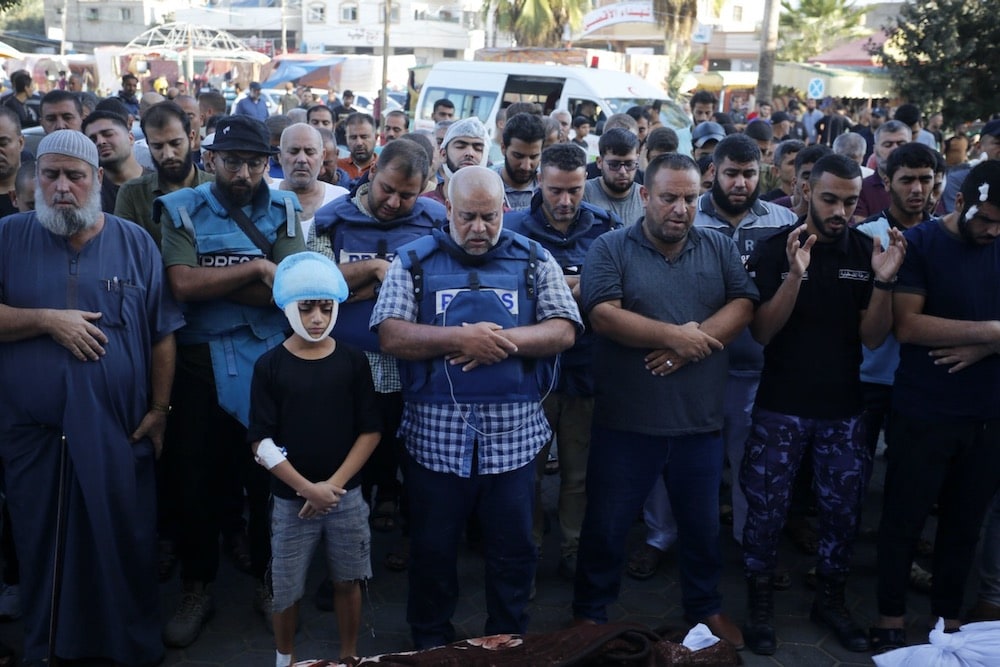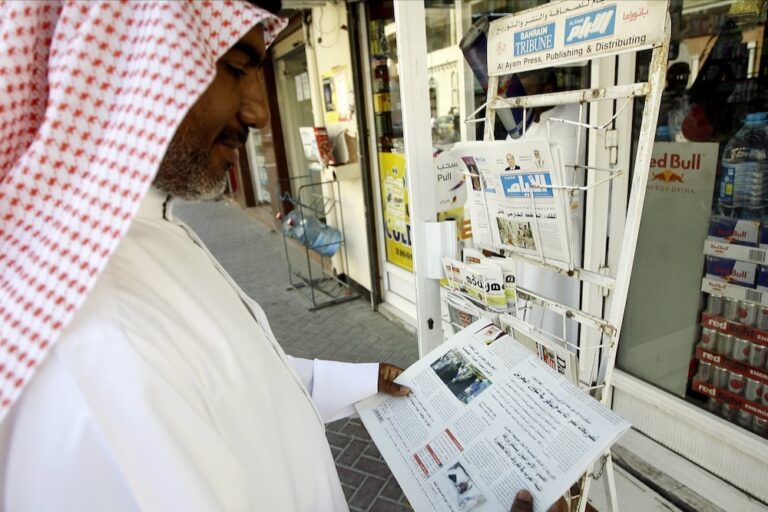Special International Day to End Impunity Issue: Naseem Tarawnah's latest Middle East & North Africa brief shines a light on the intersections between impunity, journalists' safety, and elections, based on IFEX member reports and news from the region.
Authorities crack down on critical voices ahead of Egypt’s presidential election. Israel’s silencing of Palestinian journalists, and how impunity continues to fuel violence against journalists in Sudan.
Egypt’s “engineered elections” in a restrictive civic space
As Egypt prepares for an early presidential election this December, the stage seems set for an unsurprising outcome. While President Abdel Fattah el-Sisi, who has been in power since a military coup in 2013, is expected to win a reelection bid, rights groups warn a third term could undermine state stability at a pivotal time for the country.
Amidst a severe economic crisis, an unyielding crackdown on dissent, and what rights groups describe as “the worst decade for human rights” in Egypt’s modern history”, the upcoming election is also set to vividly showcase the country’s shrinking civic space.
In a joint statement, the Cairo Institute for Human Rights Studies (CIHRS) and Egyptian rights organisations noted:
“Free media and civil society organizations are being systematically targeted in an attempt to silence them, either through highly restrictive legislation that has drawn criticism from the international community or through arrests. Egypt is now one of the biggest jailers of journalists in the world.”
With thousands of critics imprisoned, including at least 30 journalists, as well as hundreds of dissidents in exile and ceaseless state attacks on civil society organisations and independent media — the signs point to what prominent Egyptian journalist Abdallah Al-Sennawy has called another ‘engineered election’.
Recent weeks have undeniably served to offer a snapshot of this oppressive climate as authorities continue to stifle dissenting voices, including journalists, in the lead-up to the election.
Dozens of people were reportedly arrested after state-sponsored pro-Sisi rallies spontaneously turned into anti-government protests in the northern city of Mersa Matruh last month.
Opposition parties reported authorities blocking endorsements for candidates seeking to register by the 14 October deadline. Some of the most promising opposition candidates, Ahmed Tantawi, the former head of the leftist al-Karama (Dignity) Party, and Gameela Ismail, the chairwoman of the liberal al-Dostour (Constitution) Party, both dropped out of the race.
Their supporters were harassed and interrogated by authorities, with dozens of Tantawi’s supporters detained on charges related to “joining a subversive or terrorist group, spreading false news, and misusing social media.” Most were detained for merely filling out volunteer forms for Tantawi’s campaign, or liking the campaign’s Facebook page.
A recent report by digital security watchdog Citizen Lab revealed that Tantawi was targeted with Predator surveillance spyware after announcing his intention to run in March 2023. The organization does not directly name the responsible party in the report but points to previous findings of the spyware’s deployment in targeting exiled politician Ayman Nour and an Egyptian journalist.
Rather than affirming the role of journalists as vital observers of the electoral process, authorities have instead pursued independent media voices ahead of December’s vote.
Online news outlet Mada Masr reported being blocked by the state media regulator for six months and referred to the public prosecutor over its recent coverage of Israel’s attacks on Gaza. Considered one of the country’s remaining independent news outlets, Mada Masr is already subject to increased state persecution in recent months.
Prominent publisher Hisham Kassem’s appeal of a six-month prison sentence handed down to him in September was rejected by an appeals court last month. Kassem, a once potential candidate in the presidential election, was detained in August on defamation charges for online posts critical of a former government minister, in what CIHRS called a serious escalation and part of an “unrelenting targeting of peaceful dissidents” ahead of presidential elections.
Since early 2019, almost all media channels in Egypt either fall under direct state or intelligence agency control or were owned by government-aligned wealthy businessmen, according to Reporters Without Borders (RSF). Prominent TV anchors now conduct smear campaigns that target the few remaining independent journalists, leaving little room for independent voices in the media landscape.
Israel silences Palestinian journalists
Amidst growing global calls for a ceasefire and an end to Israel’s military campaign in Gaza, the escalating violence in Palestine has taken an unprecedented toll on journalists.
Besieged by continuous Israeli bombardment and a near-blackout of communications, local journalists in Gaza serve as the world’s foremost eyes and ears into an unfolding genocide. With little sleep, and even less access to water, food, electricity to charge their equipment or stable internet access, or even the time to mourn their loved ones, Gaza’s journalists have continued to deliver on-the-ground reports while they and their families are targeted from above.
The wife, son and daughter of Al Jazeera correspondent Wael Dahdouh were killed in an Israeli attack in the Nuseirat camp in central Gaza. His family sought refuge there after being displaced from their home in an earlier bombardment following calls by the Israeli authorities for civilians to move south. Eight other extended family members, including Wael’s cousin’s daughter and her four children, were also killed in the attack. After their funeral, Wael returned to work the next day:
A day after the killing, Wael’s colleague, Al Jazeera journalist Youmna Elsayed received a threatening call claiming to be from Israeli forces, warning the reporter and her family to leave their homes ahead of increased bombardment in Gaza City. Elsayed’s husband received the call and was told to head south despite the absence of safe routes out.
An initial RSF video investigation into the killing of Reuters journalist Issam Abdallah found the journalists’ vehicle was “explicitly targeted” by Israel while he and his colleagues were covering clashes at the border between Israel and Lebanon.
RSF filed a complaint with the International Criminal Court for war crimes committed against eight Palestinian journalists killed by Israeli bombardments of civilian areas in Gaza, and an Israeli journalist killed during the 7 October attack by Hamas.
Demanding an immediate ceasefire, IFEX joined the MENA Alliance for Digital Rights in denouncing Israel’s targeting and destruction of telecommunications infrastructure in Gaza that is preventing Palestinians from access to life-saving information and documenting human rights violations.
The Palestinian Digital Rights Coalition also emphasised the critical role of the Egyptian government, along with regional and international institutions, in the urgent restoration of communication and internet access for the people in Gaza:
“The blackout allows Israel to commit more crimes in darkness, to hide blatant human rights violations from the eyes of the world, including regional and international human rights organizations. Additionally, the blackout allows the spread of misinformation on a wide scale, and prevents the ability to obtain direct and factual news from the affected areas.”
Read more here about IFEX members’ efforts to address the latest violence, including the safety of journalists, online censorship, and the rise of disinformation that destroys narratives and further fuels the conflict.
Impunity fuels violence against journalists in Sudan
In Sudan, journalist Halima Idris Salim was killed by Rapid Support Forces (RSF), one of the two warring factions in the country, while reporting on the street in Omdurman. Condemning her killing, rights groups have demanded an independent investigation to hold the perpetrators accountable.
A stark reminder of the dangers Sudanese journalists face while operating in a hostile and dangerous environment, Salim’s death comes after more than six months of armed conflict have left an estimated 9,000 dead and over 4.5 million displaced, including journalists.
The Sudanese Journalists Network (SJN) condemned the impunity for violence against journalists and accused both parties to the conflict of “systematically targeting journalists and media workers who strive to convey the facts to the Sudanese people and the world.”
Last month, the UN Human Rights Council passed a resolution establishing an independent international fact-finding mission in Sudan. The resolution comes on the heels of a joint statement from over 100 rights groups calling on the council to strengthen its action by urgently putting in place a mechanism for monitoring and documenting human rights violations by the warring parties.
In Brief
In Iran, imprisoned women human rights defender Narges Mohammadi was awarded this year’s Nobel Peace Prize for her fight against the oppression of women in the country. Currently serving an unjust sentence for her activism, Mohammadi has remained a fierce advocate for women’s rights, including documenting the plight of women prisoners in her book White Torture.
Mohammadi’s award comes in a month that saw women journalists Niloofar Hamedi and Elahe Mohammadi sentenced to 13 and 12 years in prison respectively. The journalists were arrested in September 2022 following their reporting of the killing of Mahsa Amini at the hands of the morality police that inspired last year’s popular protests.
Last month, 16-year-old Armita Geravand died after a 28-day coma that followed a reported encounter with authorities on a Tehran metro car. Iranian-Kurdish rights group Hengaw said Geravand was injured in a confrontation with officers for violating the mandatory hijab dress code. Iranian authorities denied the report and claimed she had low blood pressure and fell and hit her head. Prominent women’s rights defender Nasrin Sotoudeh and fellow activist Manzar Zarabi were reportedly arrested and beaten while attending Geravand’s funeral.
New & Noteworthy
Ahead of elections in Tunisia next year, GCHR examined the extent to which the right to freedom of expression is being respected in a “gloomy electoral climate”.
IFEX and human rights organizations sent a letter to the UN Secretary-General urging a change in last month’s decision to host the upcoming Internet Governance Forum in Saudi Arabia. The groups highlighted concerns about the substantial risks it poses to the safety and security, both physical and digital, of civil society participants.



